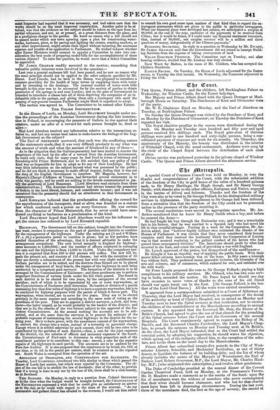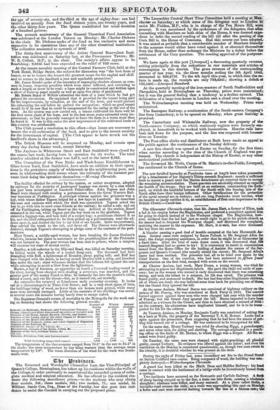gbe _Metropolis.
A special Court of Common Council was held on Monday, to vote the thanks and congratulations of the Court, with the substantial addition of the freedom of the City in gold boxes of the value of a hundred guineas each, to Sir Henry Hardinge, Sir Hugh Gough, and Sir Henry George Smith; with thanks also to the other officers, European and Native, engaged in the battles of Aliwal and Sohmon. Thanks and the freedom of the City were also to be voted to Sir George Pollock for his distinguished military services in Afghanistan. The compliment to Sir George had been deferred, from a mistaken idea that the freedom of the City could not be presented unless in the presence of the party receiving it.
The several resolutions were moved in appropriate speeches. Mr. An- derton mentioned that he knew Sir Henry Smith when a boy,and before he entered the Army— Ile had fought his way through the Peninsular war; and it was a remarkable fact in his history, that he was married to a Spanish lady who had saved his life in that eventful struggle. Putting in is word for the Corporati ,on Mr. An- derton added, that "however highly military men estimated the thanks of the Houses of Parliament, it was certain that they never considered their honour complete until they received the testimony which the Corporation of London was at that moment rendering to the gallant conduct of the heroes who had gained those unsurpassed victories." The Americans should profit by what had occurred in the East, and count the cost of provoking a war with England. Dr. Lynch approved of the praise, but disapproved of the snuffboxes—
He thought it was an. impolitic way of applying the public funds. With their poorer fellow-citizens hero-worship was on the wane. In fifty years a triumph was without fruit. They preferred moral, peaceable victories, the triumphs of the arts and sciences, and of commerce, which endured for ever, and extended over the wide world.
Sir Peter Laurie proposed the vote to Sir George Pollock; paying a high compliment to his military services. Mr. Obbard, who has two sons serv- ing in India, seconded the motion. Sir Peter hoped he should one day have occasion to move votes .of thanks to the sons of his old friend should war again break out in the East. [ Sir George Pollock is the bro- ther of the Lord Chief Baron.] All the votes were carried unanimously.
It appeared from a correspondence submitted to a Court of Aldermen on Thursday, that the Lord Mayor had resolved, in consequence of the denial of his authority as head of Christ's Hospital, not to attend on Monday and Tuesday next to hear the Spital sermons at that institution, nor to receive the children of the establishment at the Mansionhouse according to annual custom. It also appeared that the Reverend Mr. Dale, the Rector of Sc. Bride's Church, had agreed to give the use of that church for the preaching of the Spital sermons before the Court and the Governors of the several Hospitals. The Court unanimously agreed to request the Bishop of St. David's, and the Reverend Charles Farebrother, the Lord Mayor's Chap- lain, to preach the sermons on Monday and Tuesday next at St. Bride's. At the close, the Lord Mayor intimated, that as the Court had settled the essential point, by adopting his suggestion, he should waive his objection, which sprang out of the indignity offered him, to the reception of the scho- lars, and invite them on the usual day to the Mansionhouse.
Prince Albert has subscribed twenty-five pounds to the City of West- minster Literary, Scientific, and Mechanics' Institution, as one of thirty donors, to liquidate the balance of its building-debt; and the list of whom already includes the names of the Marquis of Westminster, the Earl of Radnor, Lord Robert Grosvenor, M.P., the Lord Mayor, Mr. Charles Hind- ley, M.P., (who originated this subscription) and twelve other gentlemen. The Duke of Cambridge presided at the annual dinner of the Covent Garden Theatrical Fund, held on Monday, at the Freemason's Tavern. Mr. D. Meadows made a statement as to the merits of the fund: upon the list of annuitants were the widows of members who never contemplated that their wives should become claimants, and who but for that charity must have been left in distressing circumstances. During the last year, three of the annuitants died, the first at the age of seventy, the second at
the age of seventy-six and the third at the age of eighty-four: one had isceived an annuity from the fund sixteen years, one twenty years, and the other thirty-four years. The Queen contributed her usual donation of a hundred guineas.
The seventh anniversary of the General Theatrical Fund Association wee celebrated at the London Tavern on Monday; Mr. Charles Dickens in the chair. Mr. Dickens spoke of the fund as less exclusive and more eepansive in its operations than any of the other theatrical institutions. The collection amounted to upwards of 3001.
The thirty-first anniversary of the Artists General Benevolent Insti- tution was celebrated on Saturday last, at the Freemasons Tavern; Mr. W. R. Collett, ALP., in the chair. The society's affairs appear to be flourishing: 9,8831. had been expended on the relief of 953 cases.
At the recent monthly meeting of the Central Farmers. Club, held at the York Hotel, Bridge Street, the subject for discussion was "the best form of leases, so as to insure the tenant the greatest scope for his capital and skill and to secure to the landlord a just and equitable protection.'
Mr. James Bradel spoke of the necessity of expunging obsolete clauses, so com- mon in leases, imposing penalties which were never inflicted, and extending to such a length as never to be read: a lease might be constructed and written upon a sheet of foolscap paper actually as well as upon five skins of parchment. Mr. Robert Baker of Wnttle submitted the form of a lease which he had got printed for circulation. He explained that it provided for the tenant being paid for his improvements, by valuation, at the end of the term, and would prevent his exhausting the soil before he quitted the occupation; which no good tenant Would do if he saw that he could be compensated for the outlay at the end of the term. As the system was now carried out, a tenant cultivated his farm well for the first seven years of his lease, and in the last seven years extracted every im- provement; so that he generally managed to leave the farm in a worse state than he found it. It was to this cause the slow improvement of the cultivated lands of this country was attributable.
. The Club passed a resolution to this effect—that leases are necessary to insure the well-cultivation of the land, and to give to the tenant security for the investment of capital. [The Club appear to have struck out the landlord's share in the advantage.] The British Museum will be reopened on Monday, and remain open every day during Easter week, except Saturday.
The Asylums in Whitecross Street and East Smithfield were closed for the season last week, having been in operation for six weeks. The total number admitted at the former was 3,471, and to the latter 2,362.
The Committee of the Free Baths and Wash-house Establishment in Glass-house Yard, East Smithfield, have made an addition to their opera- tions in the gratuitous supply of whitewash to the neighbouring poor, and even in whitewashing their rooms where the infirmity of the inmates pre- vents their doing the operation themselves —Morning Chronicle.
The facility afforded for robbery by the system, or rather no-system, adopted by railways for the security of passengers' luggage was shown by a case which has just been investigated at Lambeth Police-office. John Tapson and John Beard were charged with stealing a portmanteau from the Great Western Rail- way terminus at Paddington. A principal witness against the prisoners was a boy, with whose father Tapson lodged for a few days at Lambeth. He described the ease and coolness with which the theft was committed. Tapen asked the boy to go with him to meet some friends at the railway; he called a cab, and set off for Paddington, taking up Beard on the way. Arrived at the station Beard remained in the cab, while Tapson and the boy went on to the platform. Tapson entered a luggage-van, and took hold of a carpet-bag; a gentleman claimed it as his, and the thief relinquished it; he then picked up a portmanteau, read the ad- dress upon it, and desired the boy to lay hold of one handle. Quite unquestioned, they carried the trunk to the cab, and drove off. The thieves were afterwards detected, through Tapson's attempting to pledge some of the contents of the port-. manteau.
Mary Stuart, a middle-aged woman, has been breaking Sir James Graham's windows, because her claim to assistance as the granddaughter of the Pretender was not listened to. The poor woman has been sent to prison; where a surgeon will examine her state of mental sanity.
Bradley, a toll-collector in the Mile-end Road, was killed on Saturday morning, by falling under the wheels of a loaded dung-cart. The deceased had been wrangling with Roff, a lighterman of Bromley, about paying toll; and Roff has been charged with the death, in having struck Bradley with a whip, and knocked him under the cart: other witnesses declare that the tollman fell against the cart while attempting to avoid a blow from the lighterrnan. Roarer, a boy of fourteen, an apprentice on board a Cornwall trading-vessel in the river, having been charged with stealing a sovereign; was searched, and the greater part of the money found on him: he instantly ran into the master's cabia, seized a razor, and cut his throat—but, as it turned out, not mortally. An extensive firs occurred at Limelionse early yesterday morning. It broke out at a chcesemonger's in Three Colt Street; and in a very short space of time, the buildings being of wood, no fewer than six houses were gutted, while many more were seriously damaged. Little of the contents of the dwellings was saved; in several cases the inmates having barely time to escape naked.
The Registrar-General's return of mortality in the Metropolis for the week end- ing on Saturday last shows the following general results.
Number of Winter Annual deaths. average. average.
... 188 ... 101 ... 157 ... 291 27 ... 72 7 10
. 7
2 67 26 ... 988
The temperature of the thermometer ranged from 70.80 in the sun to 34.4° in the shade; the mean temperature by day being warmer than the average mean temperature by 2.8°. The mean direction of the wind for the week was South- south-west.
Zymotie (or Epidemic, Endemic, and Contagious) Diseases .... 169 ... 183 Dropsy, Cancer, rind other diselses of uncertain or variable seat 109 115 Diseases of the Amin, Spinal Marrow, Nerves, and Senses.... 182 ... 188 Diseases of the Lungs, and, of the other Organs of Respiration 316 ... 389 Diseases of the Heart and Blood-vessels
Diseases of the Stomach, Liver, tuid other Organs of Digestion 90 ... 69 Diseases of the Kidneys Re
Childbirth, disease, of the Uterus, Re.
Rheumatism, diseases of the Bones, Joints, Re
13 ...
7
Diseases of the Skin, Cellular Tissue, de
Old Age
Violence, Privation, Cold. and IntemPerance
Total (including unspecified causes) 1,028 ... 1,080



























 Previous page
Previous page